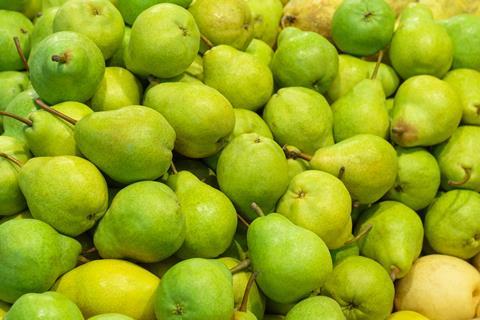Up to 100,000 tonnes of fruit could remain unharvested in the first quarter
Producers from Río Negro have warned that up to 100,000 tonnes of apples and pears could go unharvested in the first quarter of 2025 because the cost of doing so would exceed the prices offered by the large exporting companies.

As reported in Perfil, the combination of a flat dollar, falling consumption, oversupply, increased costs, high taxes and a decrease in exports of fruits such as apples and pears have combined to generate a crisis for fruit producers.
Leaving tens of thousands of tonnes of fruit to rot in orchards would lead to the disappearance of hundreds of small producers and put thousands of jobs at risk.
“Here they are evaluating whether to harvest or not. It has been 15 years since prices were so low – the cost of everything has doubled, and they are offering the same for a kilo of fruit: 200 or 300 pesos,” producer Edgar Artero told Perfil.
“In short, some 80-100,000 tonnes of fruit will be thrown away here, in the Alto Valle. It will stay on the tree, then it will rot and fall,” he added. “It has been a while since we went through such a bad situation, and the export companies have not yet paid for last year.”
Artero continued: “The worst thing is that the fruit will be left lying around. It is a shame that no one is doing anything at the provincial, municipal or national level. Food is left lying around in the fields everywhere, instead of being used. And nobody does any work. In a country like Argentina, throwing away food is sinful”.
Part of the reason for the current crisis is the fall in domestic consumption. The Argentine Confederation of Medium-sized Enterprises (CAME) estimates that retail sales fell by 10 per cent in 2024 compared to the previous year, causing stock levels to rise and producers to pay more in electricity for storing the fruit in cold stores.
“Apples that is being consumed now are ones that have been taken out of cold storage,” Artero said. “If the buyer comes and pays you (with luck) 500 pesos, you have to pay half that amount to whoever stores the fruit for you. In the case of pears, they are taken out of the cold and sold for processing, which crushes it to make pulp, for which they pay you 150 pesos per kilo. That is to say that the producer has to pay out of his own pocket to store them and he is losing money.”
The cost of fuel and labour have also gone up.
“We’ve had a complex start to the year because 2024 ended very badly,” said Martín Borocci, a producer from Allen, Río Negro. He noted that the last quarter of 2024 was so bad that it had had a knock-on effect on prices at beginning of the 2025 season, taking into account that 2024 was still a year with high inflation.
Added to that is that “the exchange rate was pegged and the tax burden was not lowered at all,” Borocci said, adding that the lack of investment and credit availability has been going on for several years.
Pablo Diomedi, a third-generation producer in Allen and Fernández Oro, in the province of Río Negro, told the newspaper: “We are one of the few small producers that still survive. All the conditions for the perfect storm are in place: we are days away from starting the harvest of pear varieties, the personnel coming from the north (about 15,000 workers from Tucumán) are already arriving, the buses are arriving, and we find that we do not know what we are going to do with the fruit.
“On the one hand we have an internal market that is totally retracted and on the other hand exports are being hampered by a depressed dollar and the devaluation of the real in Brazil, one of our main consumers, where there is also no demand.
“We have the fruit, we have the people, we have everything, but we do not know what we are going to do.”
According to CAME, the region’s exports of apples, pears and quinces contracted by 12.2 per cent in value and 24.6 per cent in volume between December 2023 and November 2024.



